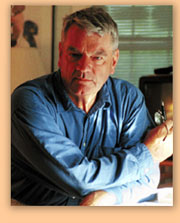| ||
published Saturday, March 11, 2000 |
London, Saturday, March 11, 2000
http://www.globeandmail.ca/gam/Letters/20000311/SALETS-14.html
Churchill: Brave and smart
London -- If I may respond, as a Churchill historian who has worked for 20 years on the great man's biography: It may well be, as Richard Langworth says (letter -- March 8), that Mr. Churchill spent many a night on the roof of No. 10 Downing Street.
As we now know, however, those nights on the roof were nights when Winston knew from codebreaking that London was not the target. When he knew that London was going to cop it, he hopped into his Daimler and had himself driven out to Dytchley, in Oxfordshire, for the night. Comparison of his desk diary, which I have, and the Air Ministry records indicate this beyond doubt. Of course, he was a magnificent orator. . . .
David Irving
This answer appeared in the Globe & Mail on March 14, 2000
Tales of Churchill
Moose Jaw -- David Irving (letter -- March 11) says that Churchill spent nights on the roofs of London during the blitz only on occasions when he "knew from codebreaking" that the Germans weren't going to be dropping bombs.
Churchill biographer Martin Gilbert writes that on March 19, 1941, during a heavy air raid, Churchill took American diplomat Averell Harriman up to the Air Ministry roof to see it. The unwarlike Harriman was apparently a frequent Churchill victim. Another Churchill biographer, William Manchester, records that while at sea in 1943, Churchill awoke Harriman with the news that a U-boat had them in its sights, with the remark, "The finest way to die is in the excitement of fighting the enemy." The frightened Harriman protested that Churchill had told him that one torpedo could not sink the ship.
Churchill replied, grinning, "Ah, but they might put two torpedoes in us. You must come with me . . . and see the fun."
Strange, is it not, how almost everyone who ever knew or wrote about Winston Churchill, other than David Irving, perceived old Winston to be recklessly courageous? -- David Orr
This answer appeared in the Globe & Mail on March 15, 2000
Mr. Irving's research
Toronto -- David Orr's letter Tales of Churchill (March 14), commenting on David Irving's letter (March 11), provides a good example of how easy it is to demolish Mr. Irving's diatribes with primary source proofs.
Mr. Irving was an acceptable, albeit self-taught, historian, usually at odds with British academics, until he lost his libel case over Convoy PQ 17, in which he was proven to be wrong in his research. This drove him to reject accepted historical analysis and devote himself to proving his theories of Holocaust denial and his claims that the Allies were the instigators and villains of the Second World War. Why give space to him? -- Ann P. Melvin
